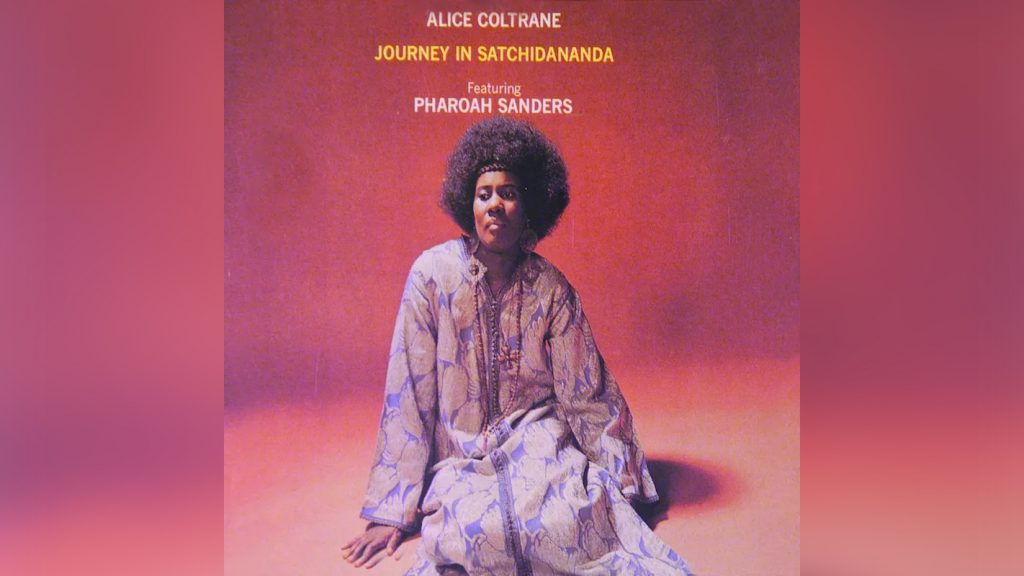The Progressive Underground: Revisiting Alice Coltrane’s 1971 album ‘Journey into Satchidananda’
Chris Campbell August 28, 2024The music of Alice Coltrane will be the subject of the Detroit Jazz Festival’s opening night performance on Friday at Hart Plaza in downtown Detroit — featuring her son Ravi Coltrane with special guests.

Cover art to Alice Coltrane's 1971 album "Journey in Satchidananda."
Welcome to Liner Notes, where we dive into the stories behind some of the most iconic albums you know and love. This time we’re exploring Journey In Satchidananda by the legendary Alice Coltrane.
In the late 1960s, jazz was evolving rapidly, with musicians pushing boundaries like never before. At the forefront of this movement was John Coltrane, who, along with his wife Alice, a classically trained pianist, began integrating the sounds of Africa and India into their music. When John passed in 1967, Alice was left devastated, raising four kids alone while grappling with her own health issues. But a surprise delivery — a concert harp John had ordered before his death — would change everything for her.
Alice took up the harp and began crafting a sound all her own, blending her Detroit bebop roots with global spiritual traditions. By the time she recorded Journey In Satchidananda in 1970, she had fully embraced her spiritual path, guided by her mentor Swami Satchidananda. This album is a testament to her transformation as both a musician and a seeker.
Track 1: “Journey in Satchidananda”
The title track, “Journey in Satchidananda,” sets the tone with its hypnotic tambura drone and grounded bass line, embodying her personal quest and spiritual tribute to her late husband, John.
This standout track features the talents of Pharoah Sanders, Cecil McBee and Rashied Ali, among others. This album marked a pivotal moment in spiritual jazz, showcasing Alice’s deepening connection to Eastern philosophy and music.
Track 2: “Shiva-Loka”
Next up is “Shiva-Loka,” a piece that transports you to the spiritual realm of Lord Shiva, one of the principal deities in Hindu cosmology. The track unfolds like a mantra, with Alice’s harp creating a free flowing, cosmic energy in tandem with the harmonic structure laid down by the tambura and harp. This track captures Alice’s fascination with the rhythms and modal structures of Indian music, weaving them into a seamless, transcendent experience.
Track 3: “Stopover Bombay”
Now, we move to “Stopover Bombay,” inspired by Alice’s stay in India. This track reflects her immersion in the vibrant spiritual life of Bombay, now known as Mumbai, a city that is often seen as a major cultural and spiritual hub of India. Pharoah Sanders’ saxophone adds layers of contemplative energy and weaves a nice interplay with Alice Coltrane’s harp.
Track 4: “Something About John Coltrane”
For Alice Coltrane, music was more than art — it was a path to healing. After losing her husband, John Coltrane, she channeled her grief and love into compositions like “Something About John Coltrane.” Not only was she grieving the loss of her partner, but she was also coming to terms with the enormous legacy he left behind. This piece honors his memory and their shared journey in both music and spirit.
Track 5: “Isis and Osiris”
We’ll close with “Isis And Osiris,” a live track that offers a stark contrast with its use of space and silence. This piece explores ancient Egyptian spirituality and mythology, adding another layer to Alice Coltrane’s rich musical tapestry.
Alice Coltrane continued to explore spiritual jazz into the mid-1970s before stepping away from the music scene to focus on her faith and family. Her hiatus would last nearly 25 years, as she recorded sporadically before returning to the stage for three U.S. appearances in the fall of 2006, including a concert at Ann Arbor’s Hill Auditorium presented by University Musical Society of the University of Michigan, and culminating with a concert for the San Francisco Jazz Festival with her son Ravi Coltrane.
Alice Coltrane died of respiratory failure in 2007, leaving behind a legacy that is both deep and broad, influencing not just jazz, but the wider musical world.
Her work has influenced artists from Radiohead, Brandee Younger, and Kamasi Washington to Erykah Badu, J Dilla, and Coltrane’s grandnephew Flying Lotus — over 50 years after its release. Journey In Satchidananda remains a transformative work, blending jazz with cosmic and spiritual elements that continue to resonate.
The music of Alice Coltrane will be the subject of the Detroit Jazz Festival’s opening night performance on Friday at Hart Plaza in downtown Detroit — featuring Ravi Coltrane with special guests Brandee Younger, Reggie Workman and the Detroit Jazz Festival Chamber Orchestra.
Listen to The Progressive Underground with host Chris Campbell every Saturday from 6-8 p.m. ET on Detroit Public Radio 101.9 WDET.
Support the shows you love.
WDET’s unique music programs are dedicated to exploring the music and culture of our region and the world.
Keep the music going. Please make a gift today.
Give now »
